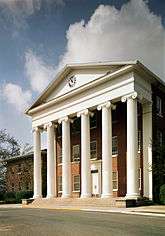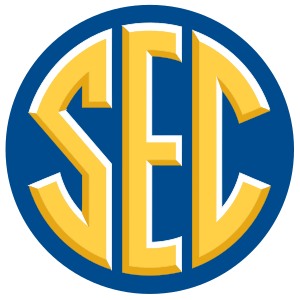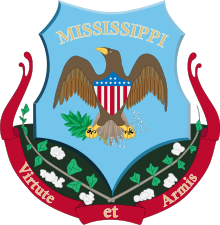Ole Miss Rebels
The Ole Miss Rebels are the 18 men's and women's intercollegiate athletic teams that are funded by and represent the University of Mississippi, located in Oxford. The first was the football team, which began play in 1893.
| Ole Miss Rebels | |
|---|---|
 | |
| University | University of Mississippi |
| Conference | Southeastern Conference |
| NCAA | Division I/FBS |
| Athletic director | Keith Carter |
| Location | Oxford, Mississippi |
| Varsity teams | 18 |
| Football stadium | Vaught–Hemingway Stadium |
| Basketball arena | The Pavilion at Ole Miss |
| Baseball stadium | Oxford-University Stadium/Swayze Field |
| Mascot | Tony the Landshark |
| Nickname | Rebels |
| Fight song | Forward Rebels |
| Colors | Cardinal Red and Navy Blue[1] |
| Website | www |
Originally known as the "Mississippi Flood", the teams were renamed the Rebels in 1936.[2] They compete in the Southeastern Conference (SEC) of the National Collegiate Athletic Association (NCAA)'s Division I, except for the rifle team, which participates in the Great America Rifle Conference because the SEC does not sponsor that sport.
The school's colors are red (PMS 186) and navy blue (PMS 2767), chosen to mirror the respective school colors of Harvard and Yale.[3] The team's mascot is Tony the Landshark, which replaced the Rebel Black Bear in 2018, which replaced Colonel Reb in 2011.[4][5][6]
Between 1995 and 2004, 630 Ole Miss student-athletes received all-conference academic honors.
Sports
| Men's sports | Women's sports |
|---|---|
| Baseball | Basketball |
| Basketball | Cross country |
| Cross country | Golf |
| Football | Rifle |
| Golf | Soccer |
| Tennis | Softball |
| Track & field† | Tennis |
| Track & field† | |
| Volleyball | |
| † – Track and field includes both indoor and outdoor. | |
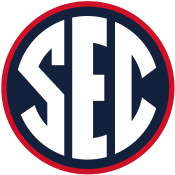
Football
The Ole Miss Rebels football team represents the University of Mississippi, also known as Ole Miss, in the sport of American football. The Rebels compete in the Football Bowl Subdivision (FBS) of the National Collegiate Athletics Association (NCAA) and the Western Division of the Southeastern Conference (SEC). The football history of Ole Miss includes the formation of the first football team in the state and the 26th team on the list of college football's all-time winning programs. The Ole Miss Rebels posted their 600th win on September 27, 2008, when they defeated the (then ranked No. 4 and future 2008 BCS National Champ) Florida Gators 31–30 at Ben Hill Griffin Stadium in Gainesville, Florida.
Throughout the 115-year history of Ole Miss football, the Rebels have won six Southeastern Conference titles (1947, 1954, 1955, 1960, 1962, and 1963) and claim three national championships (1959, 1960, 1962).
Matt Luke was offered the head football coach job (effectively ending his interim status) on November 26, 2017.
In 2019, the NCAA vacated 33 of the team's victories and levied a two-year ban on post-season play as punishment for recruiting and academic violations under head coaches Houston Nutt and Hugh Freeze.[7]
Baseball
The Ole Miss Rebels baseball team represents the University of Mississippi in NCAA Division I college baseball. The team participates in the West division of the Southeastern Conference. They are currently coached by head coach Mike Bianco and assistant coaches Carl Lafferty and Matt Mossberg. They are currently the second most populated team in the nation – an achievement reached by keeping extra utility players on the roster. They play home games at Oxford-University Stadium/Swayze Field. Ole Miss has played in the College World Series five times, most recently in 2014.
Men's basketball
The Mississippi Rebels men's basketball represents the University of Mississippi in intercollegiate men's basketball. They have participated in the NCAA Tournament in 1981, 1997, 1998, 1999, 2001, 2002, 2013 and 2015. In 2008 and 2010, the team made it to the National Invitation Tournament Semifinals at Madison Square Garden. The Rebels have won the SEC Western Division in 1997, 1998, 2001, 2007, and 2010. From 1999 to 2006, Rod Barnes coached the Rebels basketball team, and compiled a record of 141-109 during his tenure. In 1981, the Ole Miss basketball team won their first SEC tournament championship in Birmingham, Alabama and earned their second one in 2013 at Nashville, Tennessee.
Women's basketball
The Ole Miss women's basketball program began in 1974, and has been a fixture in post-season tournaments since that time. The Rebels have appeared in the NCAA Division I Women's Basketball Championship tournament seventeen times, including the inaugural 1982 tournament; they also appeared in the tournament in 1983, 1984, 1985, 1986, 1987, 1988, 1989, 1990, 1991, 1992, 1994, 1995, 1996, 2004, 2005, and 2007. They have reached the Sweet Sixteen eight times and the Elite Eight five times (1985, 1986, 1989, 1992, and 2007). They have also appeared in the Women's National Invitation Tournament in 1999, 2001, and 2006. Entering the 2008 season, the program has an all-time win-loss record of 686-353, for a 66% average.[8]
The 1992 team won the SEC with an 11-0 conference record, and finished the season with a final record of 29-3, the most wins in team history.
The program has produced such outstanding players as sisters Peggie Gillom, who still holds the school records for scoring and rebounding, and Jennifer Gillom, an Olympic medalist, Kodak All-American, and SEC Female Athlete of the Year.[9]
Perhaps the most decorated player in the program's history, guard Armintie Price, joined the Rebels for the 2003–2004 season and immediately collected SEC Freshman of the Year honors. In her collegiate career, Price was named to the All-SEC First Team three times and became the first player to be named SEC Defensive Player of the Year twice. With Cheryl Miller she is one of only two players in NCAA history to record 2000 points, 1000 rebounds, 400 assists and 400 steals. As a senior, she was a finalist for the Wooden Award and was named to the Kodak All-American Team; she led her team to their first Elite Eight appearance since 1992. Price was drafted third overall in the 2007 WNBA Draft and went on to an outstanding first season with the Chicago Sky, culminating in Rookie of the Year honors.
Coaching legend and Basketball Hall of Famer Van Chancellor built his legacy with eighteen years as the Rebels' head coach, where he compiled a record of 439 wins and 154 losses. Chancellor's legacy also includes several players-turned-coaches, including Jennifer Gillom, who helped Chancellor coach the US Senior Women's National Team to the 2002 World Championship; head coach Carol Ross, who returned to her alma mater in 2003; and current associate head coach Peggie Gillom.
Carol Ross resigned as head coach on April 26, 2007. During her four-year tenure, the Rebels' posted 77 wins and 50 losses. She was replaced by assistant coach Renee Ladner. Ladner resigned at the end of the 2011–12 season after having gone 70–82 in five seasons.[10] Adrian Wiggins, who had led Fresno State to five consecutive NCAA Tournament appearances, was hired as her replacement.[11] However, Wiggins was fired before the start of the 2012–13 season amid an investigation of potential NCAA recruiting violations.[12] Assistant Brett Frank was named as interim head coach in the wake of Wiggins' firing.[13]
After the 2012–13 season, Ole Miss hired Matt Insell, the son of Middle Tennessee head coach Rick Insell, as permanent head coach. The younger Insell had spent the previous five seasons as an assistant under Matthew Mitchell at Kentucky.[14]
Softball
Tennis
Volleyball
The 2017 Rebels finished the season at 22-14 and 8-10 in the SEC. Entering the inaugural postseason National Invitational Volleyball Championship as an at-large invitee, they lost only one set in five matches en route to winning the tournament.[15]
Notable non-varsity sports
Lacrosse
The Ole Miss Rebels Men's Lacrosse Club team is a member of the Southeast Lacrosse Conference D1 (SELC) in the Men's Collegiate Lacrosse Association (MCLA).
Rugby
Founded in 1974, Ole Miss Rugby Football Club plays college rugby in the Western Division of the Southeastern Collegiate Rugby Conference against its traditional SEC rivals such as Mississippi State. Ole Miss has seen some great crowds at recent matches since 2011.[16]
Hockey
Founded in 2009, competing in the 2009-2010 ACHA season. Ole Miss Hockey Club was founded by Colin Knight, they compete in the Southeastern Collegiate Hockey Conference (SECHC) inside of the Amateur Collegiate Hockey Association (ACHA). They won their first SECHC championship on February 9, 2020 lead by Captain Braeden Storner, and Coached by Josh Herbert.
Debate over racist symbols
Mascot
In 2010, the university changed the team mascot from Colonel Reb, "a white-goateed, cane-toting Southern plantation owner that many have criticized as racist and anachronistic," to a black bear.[17]
From September 26 through September 29, 2017, the Ole Miss student body government held a referendum on whether to keep or change the mascot from Rebel the Black Bear.[18] Of the 4,100-plus votes cast, 81% supported a change.[19] On October 6, 2017, university chancellor Jeffrey S. Vitter announced that the university was switching its official mascot to the Landshark.[20]
The term “Landshark” originated in 2008 from a senior linebacker Tony Fein and was adopted by the Ole Miss football team's defensive unit. Fein was an Army veteran who served in the Iraq War before enrolling at the University of Mississippi. Fein also received the Pat Tillman Award by the Military Order of the Purple Heart in 2008.[21]
Nickname
Following the 2020 protests connected to the death of George Floyd, there were increased calls to change the team name.[22][23]
Rivals
Ole Miss' major athletic rivals are with the Mississippi State Bulldogs (MSU), the LSU Tigers (see Magnolia Bowl), and the Arkansas Razorbacks. (see Arkansas – Ole Miss rivalry)
In football, Ole Miss and MSU close each season with the Egg Bowl, with the victor receiving possession of the Golden Egg Trophy. Ole Miss leads the series 63–43–6.
In basketball, MSU leads the series 138–105[24] In baseball, according to Ole Miss records, Mississippi State now leads the series 231–196–5 (239–195–5 according to MSU records). However, as recently as 1978, Ole Miss led the series by some six games before Mississippi State became a leader both in the SEC and nationally in baseball. Since 1978, Ole Miss is 52–90 against MSU.
LSU has a 58–40–4 advantage in the all-time football series with Ole Miss.[25]
The Hotty Toddy cheer
The Hotty Toddy cheer is a chant unique to Ole Miss. The cheer is primarily used at Ole Miss sporting events, and is commonly started by cheerleaders, fans, and players...[26] The Ole Miss Band plays the cheer with a drum cadence following the school`s fight song, Forward Rebels.[27] The band also plays a version of the cheer put to the tune of "Rock N Roll Part 2 "by Gary Glitter, known as “Hey, Go Rebs!”.[28] The two word phrase "Hotty Toddy" is commonly used as a greeting between students, alumni, and fans associated with Ole Miss, similar to the University of Alabama`s Roll Tide and Auburn University`s War Eagle.[29]
Lyrics
“Are you Ready?
Hell Yes! Damn Right!
Hotty Toddy, Gosh Almighty,
Who in the hell are we? Hey!
Flim Flam, Bim Bam,
Ole Miss By Damn!” .[30]
History
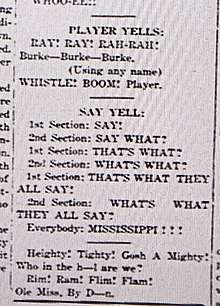
The cheer first appeared in print on November 19, 1926 in the student newspaper The Mississippian, now known as The Daily Mississippian. The Hotty Toddy was printed along with all of the popular sports cheers used by the students at the time. However, the lyrics were slightly different than the version used today. The original cheer was printed:[31]
“Heighty! Tighty! Gosh A Mighty
Who in the hell are we?
Rim! Ram! Flim! Flam!
Ole Miss By Damn.”
Possible Origins
While there are many theories as to where the Hotty Toddy cheer started, the exact origins remain a mystery. Perhaps the leading theory suggests that the cheer was created by the school`s cheerleaders or band.[32] The cheer was printed several days before Ole Miss was set to face off against instate rival Mississippi State, who were said to refer to Ole Miss fans as "Hoity-Toitys.[33]" Ole Miss had lost thirteen straight games going into the 1926 matchup in Starkville. Prior to the game, Ole Miss held pep rallies on campus and even organized a train to take the students and the newly formed Band to the game.[34] After Ole Miss won the game, the Rebel fans stormed the field and attempted to tear down their goalposts. A brawl ensued between the two schools, and the following season, the Egg Bowl Trophy was introduced to maintain the peace.[35] The iconic game that led to the creation of the Egg Bowl could also have solidified the Hotty Toddy cheer at Ole Miss.
The cheer also appeared in the school`s original fight song. According to The Ole Miss Experience, music professor Arleen Tye wrote a fight song for the school in 1931 entitled “Ole Miss.” The song`s chorus included “Hi-ty, Ti-ty, Gosh a’mighty, Who the heck are we?”.[36] While the original fight song was discontinued, the school`s current fight song, Forward Rebels, includes the Hotty Toddy cheer as well. Some historians believe the Ole Miss Band may have borrowed the cheer from the Virginia Tech Regimental Band,[37] which was nicknamed the, “Highty-Tighties” in 1919[38]
Some other theories suggest that the cheer was fashioned by Ole Miss legendary cheerleader[39] and sports fan, Blind Jim Ivy.[36] Also, it is believed that the alcoholic beverage, Hot Toddy, could be the basis for the cheer.[31]
Hotty Toddy In Pop Culture
Prior to every home football game, Ole Miss plays a video of a celebrity starting the Hotty Toddy cheer. Some of the celebrities that have participated include Russell Crowe, Snoop Dogg, Betty White, Katy Perry, Morgan Freeman, The Robertson Family from Duck Dynasty, Sandra Bullock, Jack Black, and more[40] A variation of the cheer also appeared in the series, Band of Brothers, written asHighty Tighty, Christ Almighty, Who the hell are we? zim ram, Goddamn, we`re Airborne Infantry.[41]
School Songs
The school's fight song is "Forward Rebels."[42] It is played by the Ole Miss "The Pride of the South" marching band at official university sporting events.
The song "Dixie"[43] was played by the Ole Miss band for years at athletic events until the University of Mississippi Athletic Department requested to remove the song from the Ole Miss Football and Ole Miss band playlist in 2016.[44]
A modification of the Elvis Presley song "An American Trilogy", now known as "From Dixie with Love"[42] or "Slow Dixie", was also played during football games, both home and away. The song was first played during the halftime performance at the Ole Miss/LSU game of 1980 in Tiger Stadium. Upon its completion, the band received a standing ovation from more than 70,000 people on hand that day. It soon became a staple of the band for many years. During Ole Miss's winning streak of 2003,[45] audiences began chanting "The South will rise again" in place of "His truth is marching on" at the end of the song. The chant remained a staple for the next several years. In 2009, with Ole Miss in the national spotlight for football success, political pressure mounted to do away with the chant. The Student Body Government proposed to call for the chant to be changed to "To Hell with LSU". When this proposal was not enacted, the university asked the band to quit playing the song.[46]
The band also plays a modification of "Dixie" called "Dixie Fanfare."[47]
The Hockey team has a special cheer of "HUHHH" along with power glide and Donald Trump, by Mac Miller, as the win songs.
References
- Ole Miss Athletics Style Guide. Retrieved January 14, 2020.
- Cleveland, Rick (June 19, 2003). "Colonel not exactly a longtime tradition". The Clarion-Ledger. Archived from the original on July 15, 2012. Retrieved January 12, 2010.
- "Traditions". Mississippi Rebels. Archived from the original on June 30, 2016. Retrieved July 11, 2016.
- "Rebel Black Bear Selected As New On-Field Mascot for Ole Miss Rebels" (Press release). Ole Miss Mascot Selection Committee. October 14, 2010. Archived from the original on September 4, 2015. Retrieved October 14, 2010.
- "Fins Up, Rebels!". Archived from the original on October 7, 2017. Retrieved October 7, 2017.
- "Ole Miss replaces bear mascot with Landshark". Archived from the original on October 7, 2017. Retrieved October 7, 2017.
- "Ole Miss to vacate 33 FB wins after violations". SI.com. Retrieved March 25, 2019.
- "Archived copy". Archived from the original on January 5, 2009. Retrieved August 11, 2009.CS1 maint: archived copy as title (link)/pdf1/152266.pdf?&DB_OEM_ID=2600
- "2007-08 Ole Miss Women's Basketball Media Guide". Archived from the original (PDF) on January 5, 2009. Retrieved December 11, 2007.
- "Ladner Steps Down As Ole Miss Women's Basketball Coach" (Press release). University of Mississippi Sports Information. March 2, 2012. Archived from the original on November 19, 2012. Retrieved March 29, 2013.
- "Wiggins Named Ole Miss Women's Basketball Coach" (Press release). University of Mississippi Sports Information. March 2, 2012. Archived from the original on January 11, 2016. Retrieved March 29, 2013.
- Reisbeck, Jessob (October 21, 2012). "Adrian Wiggins Fired From Ole Miss". Visalia, California: KMPH-TV. Archived from the original on June 20, 2013. Retrieved March 29, 2013.
- "Ole Miss Names Brett Frank Acting Head Women's Basketball Coach" (Press release). University of Mississippi Sports Information. March 2, 2012. Archived from the original on November 19, 2012. Retrieved March 29, 2013.
- "Matt Insell Tabbed to Lead Ole Miss Women's Basketball" (Press release). University of Mississippi Sports Information. March 2, 2012. Archived from the original on September 9, 2013. Retrieved March 29, 2013.
- "Ole Miss volleyball caps historic season with NIVC title". The Oxford Eagle. December 12, 2017. Archived from the original on December 15, 2017. Retrieved December 14, 2017.
- Rugby Mag, SCRC Poll Has LUS, Tennessee at Top, February 3, 2012, "Archived copy". Archived from the original on October 21, 2012. Retrieved September 7, 2012.CS1 maint: archived copy as title (link)
- . NYTimes https://www.nytimes.com/2010/10/15/us/15mascot.html. Missing or empty
|title=(help) - "University of Mississippi Associated Student Body, From the Desk of the President" (Press release). University of Mississippi Associated Student Body. September 18, 2017. Archived from the original on May 13, 2018. Retrieved November 28, 2017.
- "Associated Student Body Press Release" (Press release). University of Mississippi Associated Student Body. September 29, 2017. Archived from the original on May 13, 2018. Retrieved November 28, 2017.
- "Fins Up, Rebels! Ole Miss Announces Landshark as Official Mascot" (Press release). University of Mississippi Sports Information. October 6, 2017. Archived from the original on November 30, 2017. Retrieved November 28, 2017.
- "Landshark Traditions" (Press release). University of Mississippi Sports Information. October 2017. Archived from the original on December 1, 2017. Retrieved November 28, 2017.
- https://thedmonline.com/ole-miss-esports-becomes-first-university-team-to-drop-rebels/. Missing or empty
|title=(help) - https://www.usatoday.com/story/sports/columnist/dan-wolken/2020/06/18/ole-miss-should-drop-rebels-athletic-nickname/3219479001/. Missing or empty
|title=(help) - "133-105" (PDF).
- "Mississippi Opponents". College Football Data Warehouse. Archived from the original on February 16, 2010. Retrieved December 20, 2009.
- "The complicated history of Ole Miss' 'Hotty Toddy' cheer". The Oxford Eagle. October 19, 2017.
- DeJournett, Bill and Sayre, Anna McGahey, "The Pride of the South 1928-2014: The Ole Miss Band, A History" (2015). Faculty Books. 53. https://egrove.olemiss.edu/libarts_book/53
- "Index". Ole Miss Band - The Pride of the South.
- "Ole Miss Traditions". Ole Miss Athletics.
- Anderson, Seph. "Hotty Toddy: Understanding the Ole Miss Cheer, Its History & Significance". Bleacher Report.
- Wray, Cheryl (September 27, 2013). "What is a Hotty Toddy, and why do Ole Miss fans get so excited about it? (video)". al.
- University of Mississippi, "The Ole Miss" (1924). The Ole Miss Annual (1897-2013). 28. https://egrove.olemiss.edu/yearbooks/28
- The Ole Miss Experience (9th Ed) edited by Leslie Showalter. Nautilus Publishing Company, 2019, ISBN 978-1-949455-08-3
- University of Mississippi, "The Ole Miss" (1925). The Ole Miss Annual (1897-2013). 29. https://egrove.olemiss.edu/yearbooks/29
- Rollins, Khadrice. "Why is Ole Miss–Mississippi State called the Egg Bowl?". Sports Illustrated.
- Banahan, Leslie. The Ole Miss Experience: First-Year Experience Text. The Nautilus Publishing Company, 2015.
- "The Highty-Tighties: Our History". vtcc.vt.edu.
- West, Rachel (July 29, 2014). "Everything You Need to Know About the 'Hotty Toddy'".
- Smith, Edwin (March 4, 2014). "Meet James "Blind Jim" Ivy". Ole Miss News.
- Smith, Edwin (April 9, 2014). "Understanding the History and Significance of 'Hotty Toddy'". Ole Miss News.
- https://hottytoddy.com/2013/12/19/ole-miss-notes-from-the-past/
- "OleMissSports.com: Ole Miss Traditions – School songs". Archived from the original on January 13, 2010.
- "Listen to "Dixie" as played by the Ole Miss "The Pride of The South" Marching Band". Archived from the original on January 7, 2010.
- "Dixie Will No Longer Be Played at Ole Miss Football Games". thedmonline.com. August 19, 2016. Retrieved January 30, 2019.
- "Associated Press: Ole Miss head wants song halted over South chant".
- "Breaking: Chancellor asks band to stop playing 'From Dixie with Love'". Archived from the original on December 15, 2009.
- "Listen to "Dixie Fanfare" as played by the Ole Miss "The Pride of The South" Marching Band". Archived from the original on January 6, 2010.
External links
| Wikimedia Commons has media related to University of Mississippi athletics. |
